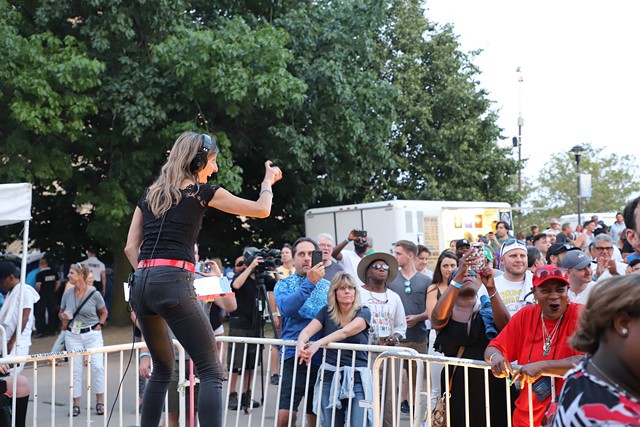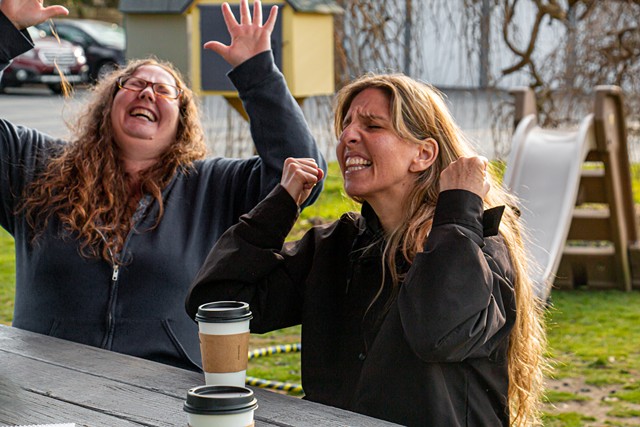Like the feeling of sun on your shoulders for the first time since winter, Rochester’s festival season awakens with a welcome wave of nostalgia: a freshly painted purple crosswalk, fragrances of buds in bloom and ablaze, the warm embrace of reggae echoing through the winding paths of Highland Park. And since 2017, two figures have joined that canon. Situated stage-left on a small podium, donning headphones and an energy that’s impossible to ignore, Terri Reisinger and Kim Billyard embody much more than showmanship as two of Rochester’s most recognizable performance interpreters.
Performance interpreting has The Grateful Dead to thank for its proliferation; the affectionately titled ‘Deafheads’ have held ground at Dead shows since the 1980s, utilizing props, technology and a flourishing pool of interpreters to deliver a sonic buffet for the Deaf and hard of hearing. This not only caught the attention of other bands keen to embrace the movement, but also then-bright-eyed college students Reisinger and Billyard.
“We talked about it as soon as we met,” said Billyard. “I found a little card written in 2003 or 2004 that said something like, ‘we are going to interpret for Phish.’”
Reisinger swiftly chimed in, “and then, that became a reality.”
For a city with the largest Deaf and hard of hearing population per capita in the United States, it’s striking that one of Rochester’s largest free, outdoor festivals didn’t hire interpreters for its headlining shows until 2017. The tide changed when Jenny LoMaglio joined Rochester Events, the production company that has organized the Lilac Festival since 2016.
“I got a phone call, a massive complaint,” she said. “The caller said, ‘I love music, I feel it. But you offer nothing.’”
Having only been part of the team for six months at the time, LoMaglio started small and hired an interpreter for an afternoon seminar in 2016, but knew she had to aim higher. The following year, she budgeted to bring on Reisinger and Billyard.
“I thought it was a perfect fit — what I didn't expect was the fanfare,” she said. “At the end of the night they would have 30, 50, 100 people crowded around them after the show talking to them, thanking them and crying.”
The duo signed a five-year contract in 2018, also joining the Party in the Park concert series and winning over Deaf and hearing fans alike.
 Blake Nitko and his wife, Dr. Sara Blick-Nitko, wager they’ve attended every Lilac Festival for the past 15 years.
Blake Nitko and his wife, Dr. Sara Blick-Nitko, wager they’ve attended every Lilac Festival for the past 15 years.
“Before they offered interpreters regularly, we wouldn’t stay too long,” Nitko wrote via Facebook Messenger, “we’d try to sneak our way up to the front, by the speakers, to feel the music, but we lose interest quickly when we can’t understand what the singers are saying.”
Both Blake and Sara are profoundly deaf, but that doesn’t stop them from enjoying the transcendent experience of a live show.
“Once interpreters were offered at these concerts, we found ourselves staying for hours at a time even until the night is over— enjoying full access to the music,” said Nitko, who is the social media manager for the National Technical Institute for the Deaf at RIT.
Despite the 1990 Americans with Disabilities Act, which requires venues and businesses to provide an interpreter when requested, not every venue or promoter approaches accessibility the same way.
“Our experiences with concerts have varied widely,” said Nitko. “Some venues turn us down outright and say they are not responsible for the interpreters, while others such as the Saratoga Performing Arts Center (SPAC) have been very accommodating, offering us seats near the front where we can see the interpreters clearly and feel the music better.”
And when it comes to the interpreters themselves, showmanship matters. Between studying, translating and practicing, Billyard and Reisinger estimate they spend 10 to 15 hours preparing for each show. Reisinger describes her approach as “transliteration,” opting to present the lyrics as performed by the artist, whereas the sentence structure of ASL could approach a phrase from a completely different direction.

“I want to see people singing along,” she said. “I want them to know those words.”
This weight of responsibility is not lost on Billyard, either.
“It's about the Deaf community being on an equal footing,” she said. “The community was just really thrilled that there was finally access provided at a festival in Rochester. So I think the Lilac Festival doing it was awesome, and I hope they set a precedent that other people will follow.”
Currently, the Lilac Festival, Rochester Fringe Festival and Party in the Park have interpreters contracted for all headlining events in 2024.
Katie Epner is a producer with WXXI and contributor to CITY.
Performance interpreting has The Grateful Dead to thank for its proliferation; the affectionately titled ‘Deafheads’ have held ground at Dead shows since the 1980s, utilizing props, technology and a flourishing pool of interpreters to deliver a sonic buffet for the Deaf and hard of hearing. This not only caught the attention of other bands keen to embrace the movement, but also then-bright-eyed college students Reisinger and Billyard.
“We talked about it as soon as we met,” said Billyard. “I found a little card written in 2003 or 2004 that said something like, ‘we are going to interpret for Phish.’”
Reisinger swiftly chimed in, “and then, that became a reality.”
For a city with the largest Deaf and hard of hearing population per capita in the United States, it’s striking that one of Rochester’s largest free, outdoor festivals didn’t hire interpreters for its headlining shows until 2017. The tide changed when Jenny LoMaglio joined Rochester Events, the production company that has organized the Lilac Festival since 2016.
“I got a phone call, a massive complaint,” she said. “The caller said, ‘I love music, I feel it. But you offer nothing.’”
Having only been part of the team for six months at the time, LoMaglio started small and hired an interpreter for an afternoon seminar in 2016, but knew she had to aim higher. The following year, she budgeted to bring on Reisinger and Billyard.
“I thought it was a perfect fit — what I didn't expect was the fanfare,” she said. “At the end of the night they would have 30, 50, 100 people crowded around them after the show talking to them, thanking them and crying.”
The duo signed a five-year contract in 2018, also joining the Party in the Park concert series and winning over Deaf and hearing fans alike.

- PHOTO PROVIDED.
- Party in the Park is one of Terri Reisinger and Kim Billyard's recurring gigs.
“Before they offered interpreters regularly, we wouldn’t stay too long,” Nitko wrote via Facebook Messenger, “we’d try to sneak our way up to the front, by the speakers, to feel the music, but we lose interest quickly when we can’t understand what the singers are saying.”
Both Blake and Sara are profoundly deaf, but that doesn’t stop them from enjoying the transcendent experience of a live show.
“Once interpreters were offered at these concerts, we found ourselves staying for hours at a time even until the night is over— enjoying full access to the music,” said Nitko, who is the social media manager for the National Technical Institute for the Deaf at RIT.
Despite the 1990 Americans with Disabilities Act, which requires venues and businesses to provide an interpreter when requested, not every venue or promoter approaches accessibility the same way.
“Our experiences with concerts have varied widely,” said Nitko. “Some venues turn us down outright and say they are not responsible for the interpreters, while others such as the Saratoga Performing Arts Center (SPAC) have been very accommodating, offering us seats near the front where we can see the interpreters clearly and feel the music better.”
And when it comes to the interpreters themselves, showmanship matters. Between studying, translating and practicing, Billyard and Reisinger estimate they spend 10 to 15 hours preparing for each show. Reisinger describes her approach as “transliteration,” opting to present the lyrics as performed by the artist, whereas the sentence structure of ASL could approach a phrase from a completely different direction.

- JACOB WALSH.
“I want to see people singing along,” she said. “I want them to know those words.”
This weight of responsibility is not lost on Billyard, either.
“It's about the Deaf community being on an equal footing,” she said. “The community was just really thrilled that there was finally access provided at a festival in Rochester. So I think the Lilac Festival doing it was awesome, and I hope they set a precedent that other people will follow.”
Currently, the Lilac Festival, Rochester Fringe Festival and Party in the Park have interpreters contracted for all headlining events in 2024.
Katie Epner is a producer with WXXI and contributor to CITY.

